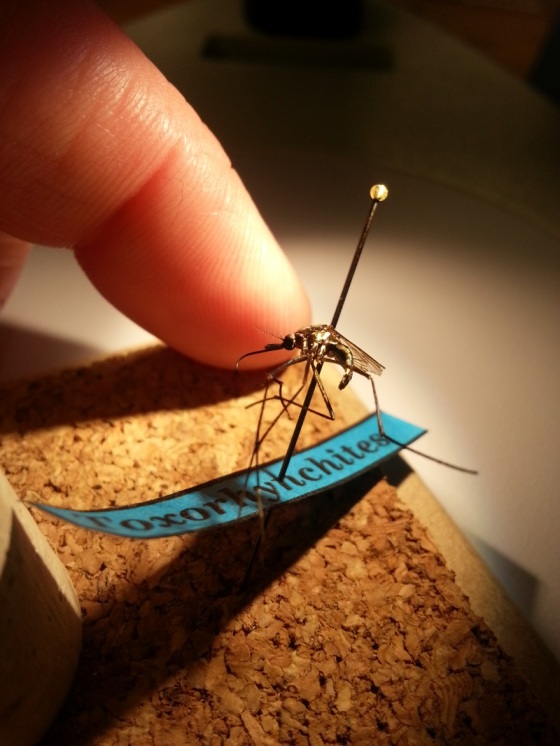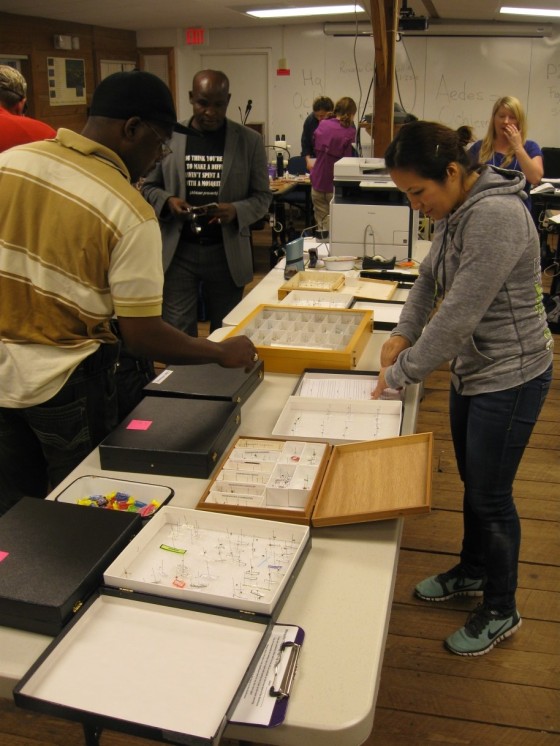Just off a main road running through a small town in Florida, a small group of enthusiastic folks, both local and foreign, sit focused. Eyes trained on minute hairs, scales, and a plethora of other physical traits, we worked diligently; all of us training to identify the 174 species of mosquitoes which call North America home. What brought us all together? The advanced mosquito identification and certification course offered by the Florida Medical Entomology Lab in Vero Beach, Florida.

Toxorhynchites, one of the “good guys”. These mosquitoes won’t bite you, and their larvae are predators on other container-inhabiting mosquito larvae. Photo by Andrew Chaulk.
First offered in 2000 as a training course for mosquito control personnel in Florida, the course has since opened its doors, inviting students from across the United States and internationally. This year’s class comprised of 21 students, four of which were Canadian (including myself, Kate Bassett – a fellow Master’s student, and our supervisor, Dr. Tom Chapman), and one student had travelled all the way from Nigeria to receive this internationally recognized accreditation. Led primarily by Dr. Roxanne Connelly, a Louisiana born entomologist who specializes in mosquito biology and mosquito borne diseases, the course is the only one of its kind and covers the principles and skills needed to identify all known mosquito species in North America north of Mexico in a fast-paced and in-depth manner. The taxonomically based course is divided into two sections, with the first week covering adult mosquito keys, and the second, taught by retired entomologist George O’Meara, covers the larval keys.
Having come all the way from St. John’s Newfoundland, we arrived in Vero Beach to a wonderful break from our typical early spring weather. The course, which ran from March 3rd to 14th, began with some brief introductions and a tour of the FMEL property before getting down to business. Each section of the course comprised of four days of instruction and practice with the keys followed by one morning of exams – one written and practical exam per section. The in class material was often broken up by opportunities to use a wide variety of mosquito collection methods. Demonstrations were also provided concerning methods of specimen preparation and during one such demonstration I was even given the opportunity to show the class how minuten pins are used since this method is not commonly used at the FMEL. Overall, while the learning curve for the course was rather steep and the instruction fast paced, there was an interesting combination of anxiety and comfort brought about by the very friendly and supportive atmosphere which I think created an excellent learning experience.

Greg Ross demonstrates some of the trapping and surveillance equipment, including lard can traps and CDC light traps. Photo by Andrew Chaulk.
Reflecting on my experience after returning to the snowy St. John’s, one unexpected yet valuable aspect of the course I took home with me was learning about the variety of backgrounds my peers had come from and how these all culminated in our taking the course together. From graduate students to naval officers, and mosquito control employees to research and medical scientists, our class was quite an interesting mix. While the foundation for my own interest in mosquitoes stems from my work for a graduate degree in biology at Memorial University of Newfoundland, I now have a much broader perspective on the amount of effort and resources that are invested in mosquito research and control.
Taking everything into account, I see this course as being one of the most valuable experiences of my graduate experience to date. Still in the first year of a Master’s degree I am working on a project centered on the mosquitoes of our province. I am concerned with questions surrounding the biodiversity of these insects in our province, their ecology and behaviour, as well as identifying possible introduction pathways of novel species. Being able to see firsthand what the results of research in this area can develop into has provided perspective for my own project and also has given me ideas of where my research can take me in the future. My expectations for this course were well exceeded and I would recommend this course to anyone who is working with these insects in any aspect.
If you would like some more information concerning course content and registration for next year’s class please visit here.
This post is also available in: Français








Great course!
I know! I took it years ago with Dr. Darsie!